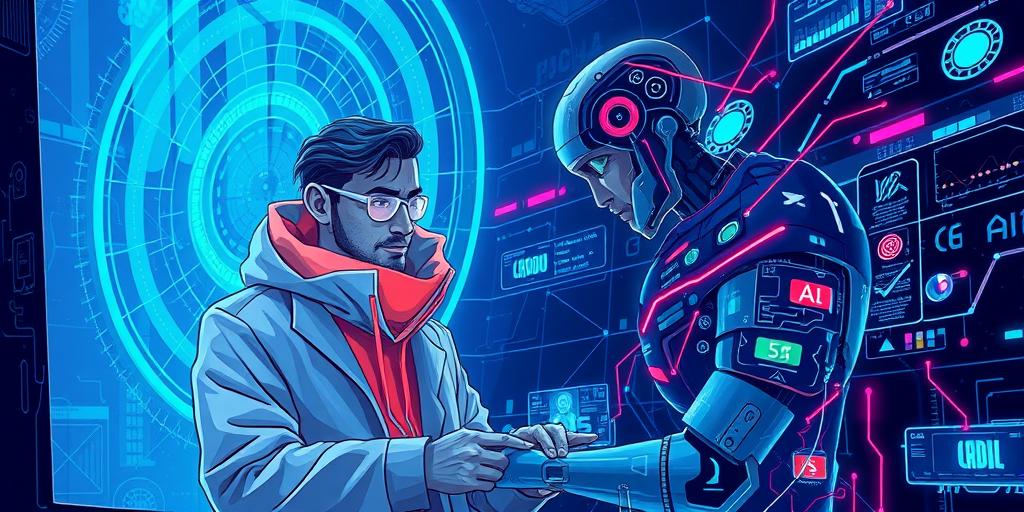Is AI replacing data scientists? The short answer is: not entirely, but it’s changing the game. Get ready for a fascinating exploration into the evolving roles of data scientists in an AI-powered world. We’ll uncover how AI is automating some tasks, creating new opportunities, and fundamentally altering the skills needed to thrive in this exciting field. Prepare to have your perceptions challenged! The future of data science is here, and it’s more intelligent than you think!
AI: The Data Scientist’s New Best Friend (and Sometimes Competitor)
Artificial intelligence (AI) is rapidly transforming numerous industries, and data science is no exception. AI-powered tools are automating repetitive tasks, such as data cleaning and preprocessing, freeing up data scientists to focus on higher-level tasks. This shift allows for greater efficiency and deeper insights into complex datasets. However, this increased efficiency inevitably leads to questions about job security and the future of data science roles. Are data scientists going to be replaced by AI? The reality is far more nuanced.
Automating the Mundane: The Rise of AI-Driven Tools
The rise of AI-powered tools is automating tasks that were once the bread and butter of data scientists. From basic data cleaning to complex model building, AI can handle a significant portion of the workflow, accelerating the process and improving accuracy in certain instances. Think of it as a powerful assistant, streamlining the data science process and enhancing productivity. However, this automation doesn’t diminish the expertise needed for critical decision-making.
The Human Element: Still Irreplaceable?
While AI can automate many processes, the human element remains indispensable in data science. AI algorithms still require human oversight. Data scientists are critical in defining the problems, choosing the appropriate algorithms, interpreting the results, and ensuring the ethical implications of AI-driven analysis are considered. The ability to understand the context, ask insightful questions, and critically evaluate outputs is distinctly human and something AI currently lacks.
New Roles, New Responsibilities: The Evolving Data Scientist
The integration of AI into data science isn’t just about automation; it’s about evolution. As AI takes over routine tasks, new roles and responsibilities are emerging. Data scientists are increasingly needed to manage and interpret the outputs of AI algorithms, ensuring accuracy and relevance. This creates a demand for professionals skilled in both data science and AI, opening up exciting new career paths.
Data Science and AI: A Powerful Combination
Data scientists with a strong understanding of AI are in high demand. This combined expertise allows them to design, implement, and manage AI models, providing invaluable insights for businesses across various sectors. The ability to leverage AI to solve complex problems, combined with critical thinking skills, is creating a new breed of highly sought-after data science professionals. This synergistic approach is revolutionizing many aspects of data analysis and decision-making.
Managing the AI Revolution: New Challenges
The rising adoption of AI brings along new challenges that demand the expertise of data scientists. Managing and maintaining AI systems requires a skilled workforce capable of addressing technical issues, ensuring data security and privacy, and mitigating potential biases within AI algorithms. This need for robust oversight and responsible AI implementation creates even more job opportunities in the field.
The Skills of the Future Data Scientist: Adaptability is Key
The rapidly evolving landscape of data science necessitates continuous learning and adaptation. While AI handles many routine tasks, data scientists need to upskill and acquire new competencies to remain relevant. This involves deepening their understanding of AI, machine learning, and related technologies. Problem-solving skills, critical thinking, creativity, and strong communication skills are more vital than ever.
Lifelong Learning: Embracing Continuous Education
The future belongs to those who embrace continuous learning. Data scientists must engage in lifelong learning, continuously updating their skills and knowledge to stay ahead of the curve. Online courses, workshops, and advanced degree programs are invaluable resources in this ever-evolving field. Adaptability and a commitment to ongoing professional development are crucial for success.
Focusing on High-Level Thinking and Creativity
While AI automates many tasks, the uniquely human skills of critical thinking, problem-solving, and creativity will remain highly valued. The ability to approach problems from multiple angles, generate creative solutions, and interpret complex data sets will be vital to driving innovation and making critical business decisions. This human-centric approach to data analysis is irreplaceable.
Conclusion: The Future is Bright for Data Scientists
In conclusion, AI isn’t replacing data scientists, it’s transforming their roles and responsibilities. While automation handles routine tasks, the need for human expertise, critical thinking, and creative problem-solving remains central to the future of data science. By embracing continuous learning, adapting to new technologies, and focusing on their uniquely human capabilities, data scientists can not only survive but thrive in this rapidly evolving landscape. So, what are you waiting for? Start upskilling today and embrace the exciting future of data science!




